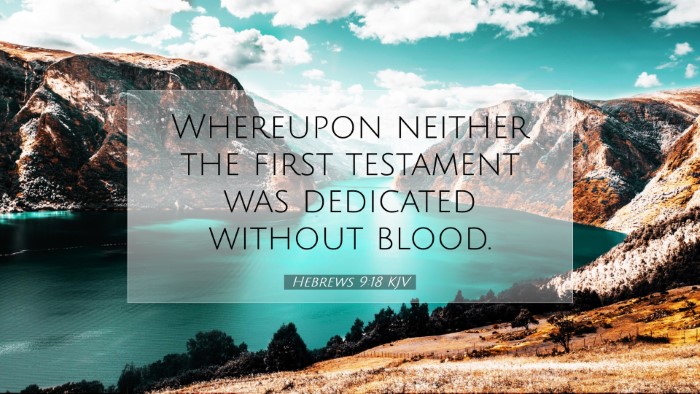Commentary on Hebrews 9:18
The verse Hebrews 9:18 states: "Whereupon neither the first testament was dedicated without blood." This verse serves as a pivotal point in the argumentation of the epistle to the Hebrews, emphasizing the indispensable role of blood in the establishment of the covenant between God and His people.
Contextual Background
To fully understand the significance of this verse, it is crucial to appreciate its context within the broader narrative of the Epistle to the Hebrews. The writer of Hebrews seeks to elucidate the superiority of the new covenant established by Christ in contrast to the old covenant of the law.
The Necessity of Blood in Covenant Making
As noted by Matthew Henry, blood signifies life and is regarded in both the Old and New Testament as a necessary element for atonement and covenant establishment. The old covenant, instituted at Sinai, necessitated blood as a visible sign of the relationship forged between God and Israel.
In the ancient Near Eastern context, covenants were often ratified through sacrifices, wherein the shedding of blood represented a binding agreement. This principle carries significant implications for understanding divine covenants.
Analysis by Albert Barnes
According to Albert Barnes, the phrase "neither the first testament was dedicated without blood" demonstrates that the `first covenant` was inherently linked to sacrifice. He points out that Moses, upon receiving the law, sprinkled the blood of sacrificial animals on the people and the book of the covenant, confirming the covenant in blood.
- This ritual highlights the seriousness of the commitment made by both God and the people.
- Barnes articulates that the sacrificial system depicted not only a physical reality but also pointed towards the spiritual necessity of atonement, ultimately fulfilled in Christ.
Theological Implications
Adam Clarke emphasizes the theological depth of the blood symbolism in Hebrew worship. Clarke expounds that blood serves as a metaphor for purification and redemption. The implications are profound: just as the old covenant required blood for its establishment, so too does the new covenant established by Christ necessitate His blood for redemption.
This highlights the unity of Scripture, where the themes of sacrifice, atonement, and covenant faithfulness weave through both the Old and New Testaments.
The Significance of the New Covenant
The transition from the old to the new covenant is a key theme throughout the Book of Hebrews. The writer reaffirms that the sacrificial system, while necessary for the temporary covering of sins, finds its completion in Christ. His sacrifice is both the culmination and fulfillment of the long-anticipated promise of redemption.
As pastors and theologians reflect on this passage, they are encouraged to consider how the blood of Christ redefines the covenant relationship between God and His people.
Conclusion
In summary, Hebrews 9:18 serves as a profound reminder of the severity and sanctity of the covenant between God and humanity. The necessity of blood, as illustrated through the rituals of the old covenant, underscores the gravity of sin and the crucial role of sacrifice. This life-giving principle, outlined throughout Scripture, culminates in the redemptive work of Christ.
For pastors, students, and scholars, this verse invites reflection on the depth of God’s love manifested through the shedding of Jesus’ blood, allowing a new covenant of grace and relationship to flourish. As we embrace this truth, we find both a solemn obligation and a joyous promise as we engage with the foundational aspects of our faith.


